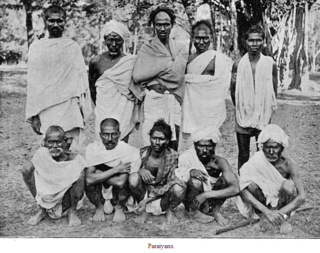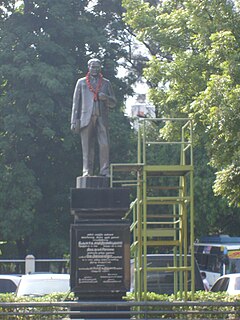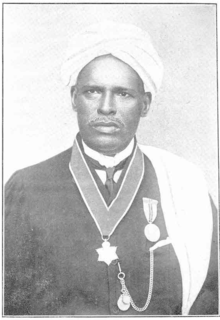
Iyer is a caste of Hindu Brahmin communities of Tamil origin. Most Iyers are followers of the Advaita philosophy propounded by Adi Shankara and adhere to Smarta tradition. This is in contrast to the Iyengar caste, who are Vaishnavite Hindus. The majority of Iyers reside in Tamil Nadu, India.
Nadar is a Tamil caste of India. Nadars are predominant in the districts of Kanyakumari, Thoothukudi, Tirunelveli and Virudhunagar.
The Justice Party, officially the South Indian Liberal Federation, was a political party in the Madras Presidency of British India. It was established on 20 November 1916 in Victoria Memorial Hall in Madras by Dr C. Natesa Mudaliar and co-founded by T. M. Nair and P. Theagaraya Chetty as a result of a series of non-Brahmin conferences and meetings in the presidency. Communal division between Brahmins and non-Brahmins began in the presidency during the late-19th and early-20th century, mainly due to caste prejudices and disproportionate Brahminical representation in government jobs. The Justice Party's foundation marked the culmination of several efforts to establish an organisation to represent the non-Brahmins in Madras and is seen as the start of the Dravidian Movement.

Tiruchendur is a municipality located in the southern tip of India, in the Thoothukudi district of Tamil Nadu. It is home to Arulmigu Subramaniya Swamy Temple, also known as Tiruchendur Murugan Temple, which is one of the abodes of Murugan and one of the ancient Hindu temples dedicated to Lord Murugan. Tiruchendur is well-connected by roads and railroads with the rest of Tamil Nadu and India and the nearest railway station is Tiruchendur railway station. Tiruchendur is just 53 km from Tirunelveli.

Paraiyar, or Parayar or Maraiyar, is a caste group found in the Indian states of Tamil Nadu and Kerala, and Sri Lanka.

Sir Ponnambala Thiaga Rajan was the Chief Minister of Madras Presidency from 4 April 1936, to 24 August 1936. He was also the last President of the Justice Party. P. T. Rajan was born in a Thondaimandala mudaliar family in Uthamapalayam. His ancestors were from Kanchipuram. He attended The Leys School, Cambridge and later, Jesus College, Oxford. He graduated in history and law, and practiced as an advocate for some time before joining the Justice Party.
Nadar (1820–1910) was a French photographer, caricaturist, journalist, novelist, balloonist and proponent of manned flight.

Nagamalai is a suburb of Madurai situated about 10 km west of Madurai City, Tamil Nadu, India, along the Madurai-Theni highway.

Erode Venkatappa Ramasamy, commonly known as Periyar or Thanthai Periyar, was an Indian social activist and politician who started the Self-Respect Movement and Dravidar Kazhagam. He is known as the 'Father of the Dravidian movement'. He rebelled against Brahminical dominance and gender and caste inequality in Tamil Nadu. In 2021, Government of Tamil Nadu decided to celebrate his birth anniversary as 'Social Justice Day'.
C. Iyothee Thass was a prominent Tamil anti-caste activist and a practitioner of Siddha medicine. He famously converted to Buddhism and called upon the Paraiyars to do the same, arguing that this was their original religion. He also founded the Punchmar Mahajana Sabha in 1891 along with Rettamalai Srinivasan. Punchamas are the ones who do not come under Varna system; they are called as Avarnas.

Woothampatti Punnaivana Ayya Soundarapandian was a leading figure in Nadar Mahajana Sangam and became the first Nadar member of the Madras Legislative Council upon a recommendation by P.T. Rajan in 1920. He is known for his effort to associate the Nadar community with the Self-Respect Movement founded by Periyar E. V. Ramasamy. He was known as the uncrowned king of the Nadar community.
Tamilnad Mercantile Bank Limited (TMB) is a bank headquartered at Thoothukudi, Tamil Nadu, India. TMB was founded in 1921 as the Nadar Bank, but changed its name to Tamilnad Mercantile Bank in November 1962 to widen its appeal beyond the Nadar community. For the financial year 2018–2019, the bank reported a net profit of ₹ 2585 million. The bank currently has 509 full branches throughout India, 12 Regional offices and two link offices, two central processing centres, one Service Branch, four Currency Chests, 48 eLobby centres, 262 Cash Recycler Machines and 1135 Automated Teller Machines (ATM). The bank has been expanding its footprint all over India.
Nadans are a small endogamous group of aristocratic Nadars from the regions south of the Thamirabarani River in the present-day state of Tamil Nadu, India. They were hereditary tax collectors during the Nayak and Pandyan dynasties and also served as petty lords under the poligars. The Nadans possessed vast tracts of land and were one of the few subcastes among the Nadars to have practiced aristocracy. The term Nadan means lords of the land.

The Bungalow on the Beach is a 17th-century Danish colonial house which has belonged to the Governor of Danish India, who was styled Opperhoved, and after their exit in 1845, to the British administrator of the colony. Built in the 18th century, opposite the Fort Dansborg, by the Danish East India Company in what was once a pepper trading post of Tranquebar, now known as Tharangambadi, in Tamil Nadu, India. Tranquebar is a Danish term and came from the native Tamil word Tarangambadi, meaning 'place of the singing waves'.
Nadar climbers were a sub-caste of today's Nadar community. They were regarded as the largest Nadar sub-caste. Their traditional occupation was climbing trees, gathering the sap of coconuts to make palm wine. Due to new economic opportunities, the majority of Nadar climbers have given up their traditional occupation.

The Self-Respect Movement is a South Asian movement with the aim of achieving a society in which backward castes have equal human rights, and encouraging backward castes to have self-respect in the context of a caste-based society that considered them to be a lower end of the hierarchy. It was founded in 1925 by S. Ramanathan who invited E. V. Ramasamy to head the movement in Tamil Nadu, India against Brahminism. The movement was extremely influential not just in Tamil Nadu, but also overseas in countries with large Tamil populations, such as Malaysia and Singapore. Among Singapore Indians, groups like the Tamil Reform Association, and leaders such as Thamizhavel G. Sarangapani were prominent in promoting the principles of the Self-Respect Movement among the local Tamil population through schools and publications.

Rao Sahib Pandithar was a Tamil musicologist, composer and a traditional medicine practitioner from Sambavar vadakarai of Tirunelveli District, who is celebrated for his patronage of numerous Tamil musicians and his influential studies concerning the origins and evolution of traditional Tamil music.
Nadar Mahajana Sangam S. Vellaichamy Nadar College is an educational institution located at Nagamalai, Madurai, Tamil Nadu, India. It was started in 1965 by Nadar Mahajana Sangam and offers bachelors and masters level degrees. The college is affiliated with Madurai Kamaraj University. It is a co-educational, autonomous and ISO 9001:2008 certified institution and was re-accredited as "A" grade by the National Assessment and Accreditation Council (NAAC), Bangalore on 10 March 2012.
Kamaraj College is one of the oldest Arts & Science Colleges in Tamil Nadu. It is located in the southern city of Thoothukudi. It was established in the year 1966 by The Tuticorin Education Society. The College has been named after the former Chief Minister of Tamil Nadu K. Kamaraj as a tribute to the invaluable service rendered by him to the nation, particularly to the cause of education. The college is affiliated with Manonmaniam Sundaranar University. The college offers different courses in Arts, Commerce and Science.










